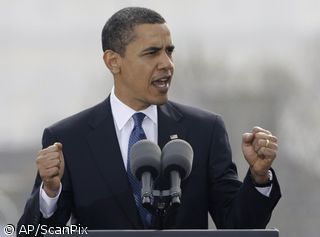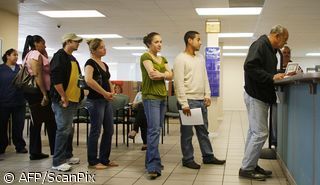It is the only source that can provide a chance for economic breakthrough
Published:
21 March 2005 y., Monday
Money from Russia’s Stabilisation Fund is expected to be invested abroad in dollar-nominated securities, with minimum investment risks and minimum profitability at 2-4%. These funds have until now been kept in Central Bank accounts. This means that a great deal of money will soon appear on the financial markets. On February 1, 2005, the Fund totaled 647.2 billion roubles ($23.1 billion), which mostly came from taxes on oil sales with prices exceeding $20 per barrel and export duties from oil companies.
The crucial question is how this money should be used. Money can only be taken out of the Fund when it has more than 500 billion roubles. Therefore, more than a fifth of its resources can already be used. This is a key issue for Russia’s economy, as the positive overseas market situation in recent years has been almost exclusively responsible for its growth.
However, experts are not tired of repeating that the potential of the resource-oriented Russian economy has been virtually exhausted. The mechanism whereby "we produce oil, sell it and enjoy the benefits" is becoming increasingly less effective. The country is now at a stage when it must introduce an industrial policy. However, any policy only makes sense when there is money to implement it.
Russia’s stock market and banking system do not provide the necessary financing for the real sector of the economy. Direct foreign investment in Russia remains at a very low level, while foreign investment in general is concentrated on either the import of equipment or foreign borrowings. The country obviously needs sources for further growth. The Stabilisation Fund is virtually the only potential source today and a genuine war is being waged for its funds.
Šaltinis:
financialexpress.com
Copying, publishing, announcing any information from the News.lt portal without written permission of News.lt editorial office is prohibited.
The most popular articles
 On August 4, the first chartered flight of "The Japan Airlines" will arrive from Tokyo in the Baltic States and land in Riga.
more »
On August 4, the first chartered flight of "The Japan Airlines" will arrive from Tokyo in the Baltic States and land in Riga.
more »
 1.6 billion rouble loan to overcome problems holding up expansion of city of Surgut
more »
1.6 billion rouble loan to overcome problems holding up expansion of city of Surgut
more »
 Nordic Shared Services & Outsourcing Forum 2009, 26 – 27 August, Sweden
more »
Nordic Shared Services & Outsourcing Forum 2009, 26 – 27 August, Sweden
more »
 Results of the latest price survey by Eurostat show that Lithuania is on the list of the TOP 10 least expensive countries in Europe.
more »
Results of the latest price survey by Eurostat show that Lithuania is on the list of the TOP 10 least expensive countries in Europe.
more »
 The European Commission's Digital Competitiveness report published today shows that Europe's digital sector has made strong progress since 2005.
more »
The European Commission's Digital Competitiveness report published today shows that Europe's digital sector has made strong progress since 2005.
more »
 US President Barack Obama said that the economy was weaker than he thought when he took office, but there are signs of improvement.
more »
US President Barack Obama said that the economy was weaker than he thought when he took office, but there are signs of improvement.
more »
 The EIB and UniCredit Group strengthen their cooperation to implement the Joint Action Plan of the largest multilateral lenders in Central and Eastern Europe who have committed to provide up to EUR 24.5 bn lending to the SME sector hit by the global economic crisis.
more »
The EIB and UniCredit Group strengthen their cooperation to implement the Joint Action Plan of the largest multilateral lenders in Central and Eastern Europe who have committed to provide up to EUR 24.5 bn lending to the SME sector hit by the global economic crisis.
more »
 Within the first half of 2009, AB Bank SNORAS earned LTL 24 million of unaudited profit.
more »
Within the first half of 2009, AB Bank SNORAS earned LTL 24 million of unaudited profit.
more »
 10,000 workers were helped by the European Globalisation Adjustment Fund (EGF) last year and of these, more than two-thirds found a new job, according to a report adopted by the European Commission today.
more »
10,000 workers were helped by the European Globalisation Adjustment Fund (EGF) last year and of these, more than two-thirds found a new job, according to a report adopted by the European Commission today.
more »
 SEB recently won awards for best consumer Internet banks in Lithuania and Latvia in a ranking presented by Global Finance Magazine.
more »
SEB recently won awards for best consumer Internet banks in Lithuania and Latvia in a ranking presented by Global Finance Magazine.
more »